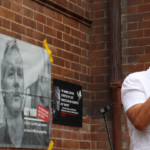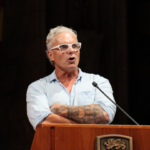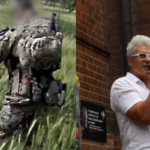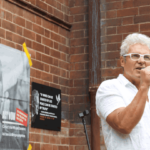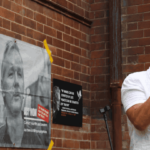McBride’s Guilty Plea Has Sent a Chill Down the Spine of the Australian Polity
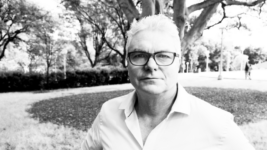
“That is a fatal blow,” said Mark Davis, the criminal lawyer representing former ADF legal officer David McBride, as he faces a five charge indictment for having blown the whistle on the Australian war machine in Afghanistan, which had fostered a climate that saw the illegal killing of civilians.
The blow the lawyer referred to out the front of the ACT Supreme Court last Friday, 17 November, a week into the trial, was that the prosecution, the government, had been permitted to “bundle up” a large swag of the defence evidence and “run out the backdoor with it”.
After raising concerns about special forces operations in Afghanistan with his superiors only to be ignored a decade ago, McBride, a lawyer who served two tours of duty in the foreign theatre in 2011 and 2013, leaked classified documents revealing crimes to the ABC over 2014 to 2016.
McBride’s leaks resulted in the 2017 report The Afghan Files. And by that stage, the ADF had already established its own inquiry into rumours that international law was being broken. And this led to the 2020 Brereton report, which referred 19 personnel to the AFP for potential war crime prosecutions.
With much of his evidence deemed a national security threat and removed, McBride, whose trial was already cloaked in national security secrecy orders, was left with little choice but to plead guilty, especially as his main defence line, that he acted in the public interest, had already been denied.
To blindly follow
McBride has pleaded guilty to five national security charges that could put him away for a very long time. These include one count of theft of Commonwealth property, three counts of unlawfully giving away defence information and another of unauthorised disclosure of information.
As his trial began on 13 November, McBride’s defence team told the court that the ex-military legal officer proposed to put a defence that asserted he’d been doing his duty as a military officer by revealing this classified information as it was in the public interest.
The defence argued that McBride had found himself aware that soldiers were perpetrating war crimes in contradiction to both international and domestic law, and under such circumstances, his duty to the nation, as an ADF officer, superseded that of following military discipline.
The prosecution’s Trish McDonald SC put it to the court that “a soldier does not serve the sovereign by promising to do whatever the soldier thinks is in the public interest, even if contrary to the laws made by parliament,” and she added that what this defence presents is “the antithesis of service”.
ACT Supreme Court Justice David Mossop agreed with the prosecution and ruled against McBride being able to argue his defence to the jury last Wednesday, stating that “there is no aspect of duty that allows the accused to act in the public interest contrary to a lawful order”.
McBride’s legal team ran a last-minute appeal of this decision on Thursday morning, arguing that it implies that a military officer must follow the orders of his superiors no matter how unreasonable or in breach of basic rights they may be. However, the appeals court denied this point.
A declining moral compass
“The ruling was he doesn’t have a duty to serve the interests of the Australian people, he has a duty to follow orders,” Davis reiterated out the front of the court. “It is a very narrow understanding of our view that takes us back really to pre-World War II.”
This take on the duty of an officer being to his higherups is known as superior orders or the “just following orders” defence, which was found, during the post-Second World War Nuremberg Tribunal, to provide no immunity to an individual when facing prosecution under international law.
McBride is now expected to be sentenced to prison time and he’s looking towards a High Court challenge of this determination, which, as it currently stands, seems to fly in the face of basic Australian democratic principles and will act as a distinct deterrent to whistleblowers nationwide.
McBride’s prosecution was one of three high-profile cases launched by then Coalition attorney general Christian Porter in 2018. This campaign designed to punish those who expose corruption raised questions about how whistleblowers are valued and whether the law protects them.
“David’s trial is already under national security orders which make it a secret trial. None of you will be allowed to hear what happens next week,” Davis told the crowd of McBride supporters outside the court following Friday’s hearings.
The criminal defence lawyer added that his client had waited five years to articulate his position to the court and it had been “a sad and difficult day to advise David on his options… and that he embrace him”.


